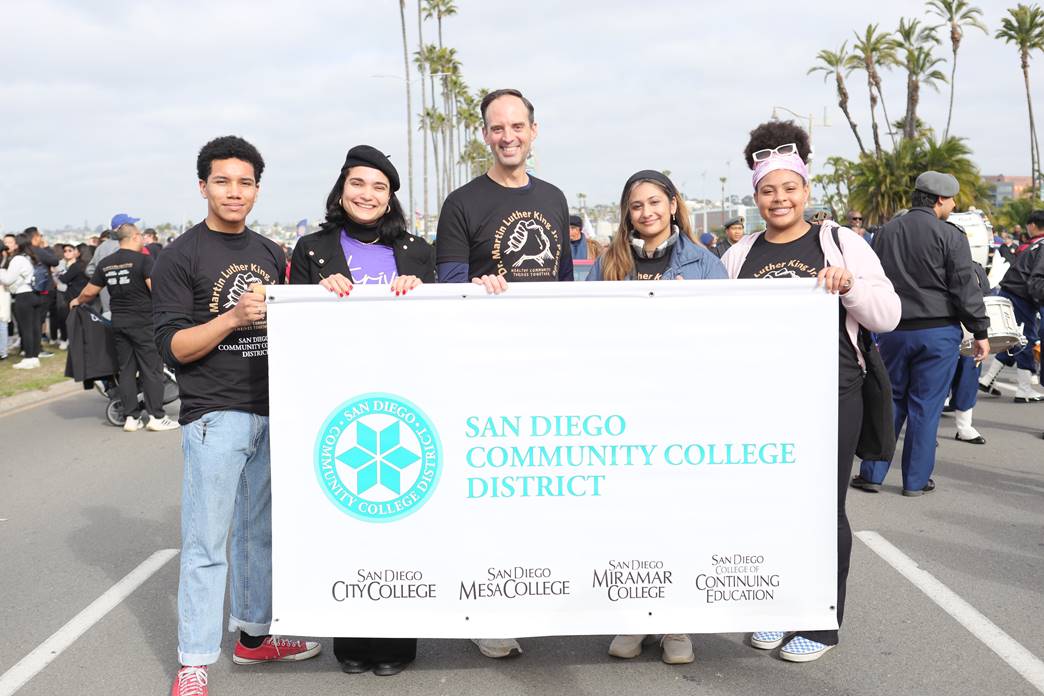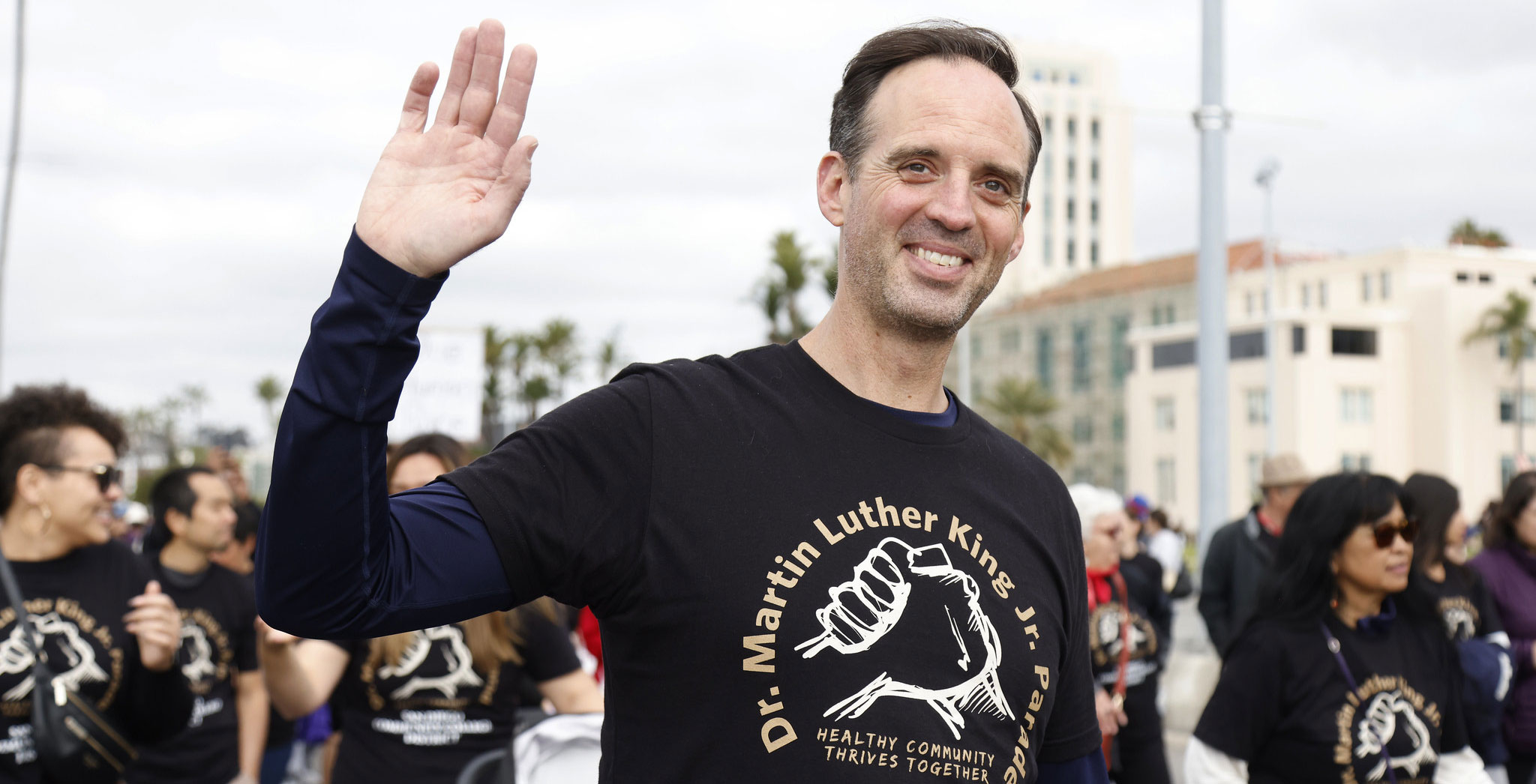At the start of the millennium, Gregory Smith was a college student looking for work, barely making ends meet, living in Phoenix and driving a busted car with no air conditioning. That’s when he learned about an opening for a position as a compliance officer with the U.S. Department of Labor enforcing equal employment opportunity and affirmative action regulations. He jumped at the opportunity.
His role with the federal office would set the foundation for a career dedicated to safeguarding the rights of the most vulnerable. It also set him on a pathway that would lead him to being named the San Diego Community College District’s seventh chancellor in its 50-year history.
Chancellor Smith’s first day at his new position began February 1, and his focus is clear.
Related Article: Q and A with Chancellor Smith
“My vision is creating an environment where everybody who comes here feels they can be who they are authentically, an environment where students know and feel they belong, a District that’s invested in them, that supports them as they become the person they want to be,” he said.
As chancellor, Smith is responsible for a $1 billion annual budget and all operations for a system that stands as the largest provider of workforce training and higher education in the region. The District and its four colleges ― San Diego City, Mesa, Miramar, and Continuing Education colleges ― have an annual economic impact of $4.5 billion. Enrollment is growing and, thanks to the governing board’s careful stewardship, the District’s fiscal health remains solid.
But challenges remain. Many students are still struggling as a result of the COVID-19 pandemic, which required some to put their education on hold. The state, which funds most District operations, is facing a budget deficit estimated at $38 billion in 2024-25, with multi-billion-dollar deficits projected for following years. The District, in need of significant upgrades to support the latest innovations in technology, as well as much needed facilities upgrades and repairs, is preparing to place its first bond program on the ballot since 2006.
Additionally, Chancellor Smith takes over on a permanent basis at a time when the U.S. Supreme Court is taking a more hostile attitude to diversity, equity, inclusion, and accessibility (DEIA) and affirmative action in hiring practices.
He remains undeterred. Smith likes to tell people: “Relentless optimism is my superpower.”
 Chancellor Gregory Smith at the MLK Parade in 2024.
Chancellor Gregory Smith at the MLK Parade in 2024.
Those who know him say Chancellor Smith, who served as acting chancellor for nearly a year, is more than ready for whatever comes his way.
“One of the things that really strikes me is how skilled he is in understanding how data affects solid decision-making,” said SDCCD Board of Trustees President Bernie Rhinerson. “It’s also quite remarkable how he has detailed data at his fingertips. Ever since he joined the team as vice chancellor of People, Culture, and Technology Services in 2020, he has exhibited the highest standards of insight and innovation in the work that he does. He is a true leader.”
Joe Wyse, who recently retired as superintendent/president of the Shasta-Tehama-Trinity Joint Community College District, shared similar sentiments. Wyse got to know Chancellor Smith well when Smith served as director of Human Resources, associate vice president of Human Resources, and interim vice president of Administrative Services at the Shasta-Tehama-Trinity Joint Community College District in Northern California.
“Greg Smith is a thoughtful, caring leader who worked diligently to advance the mission of our system, improve the working environment for all our employees, and advance the opportunities we provide all of our students,” Wyse said. “After the first couple of years working together, I thought Mr. Smith would be a president or chancellor someday, and I am happy to see it come to pass. San Diego Community College District is in good hands.”
***
Gregory Smith was born to working class parents and grew up in the rural Southern California communities of Trona and Ridgecrest. Ridgecrest abuts Naval Air Weapons Station China Lake, which draws scientists, researchers and mathematicians from across the globe. His classmates, whose parents had Ph.D.s and master’s degrees, would later enroll at schools such as Yale, University of California, Berkeley, and University of California, Los Angeles. Chancellor Smith, the grandson of a foster child, turned to Cerro Coso Community College as the only affordable option ― ultimately his experience illustrated the promise a community college offered.
“My parents could not go to college, my grandparents could not go to college, so it was really important to them that I go, because their prospects were really limited,” he said.
Chancellor Smith later moved to Arizona, and when he was able to establish residency, enrolled at Arizona State University. It was while he was earning his bachelor’s degrees in English literature and political science (he graduated summa cum laude) that Chancellor Smith was hired as a senior compliance officer with the Department of Labor. He was content ― until his supervisor, a retired Air Force major, saw his potential.
“He told me that if I stayed a compliance officer, my career would amount to an incredible waste of ability,” Smith recalled. “He drove into me that when you go into public service, you have an obligation to find the highest level at which you can contribute, and then you have to reach that level.”
Message received.
Chancellor Smith pushed himself in a laser-focused quest to help others and ultimately would be named a District director in the Department of Labor’s San Jose office where he led staff in the Bay Area, Hawaii, and Guam in conducting compliance evaluations and public outreach. He
also earned his master’s degree in public administration at University of Southern California along the way. Meanwhile, his family had moved to Shasta, Calif., about the same time a Human Resources position at Shasta College opened up.
“I was immediately intrigued,” Chancellor Smith said. “A community college had been such an important part of my trajectory and my pathway to something that otherwise never would have happened.”
The retired Air Force major’s words from years earlier convinced him the move was necessary.
“I loved the aspect of the work I was doing, but I realized how limited that was at the federal level,” he said. “It really was a rather small impact. I wanted to get closer to the people living in the local community to see what they were experiencing and the opportunities, or the lack of opportunity, they had.”
It ended up being a perfect pairing, as Shasta College was looking for an expert in data analysis to measure the effectiveness of their Equal Employment Opportunity plan, and essentially “that was my day job for 12 years,” Smith recalled.
At Shasta College, Chancellor Smith embarked on transformative work. He rewrote contracts with bargaining teams and empathized with the concerns of classified professionals. He revised the accommodations process, injecting humanity into human resources. He opened the door for formerly incarcerated students to be employed with the college for the first time.
“I had this tremendous sense of fulfillment. Even the smallest things, I saw how it affected people,” said Chancellor Smith.
His star was quickly rising and he was asked to sit on statewide and national committees and task forces. The 16-member California Community Colleges Chancellor’s Office Diversity, Equity, and Inclusion Task Force was one of them. In 2020, it released a comprehensive 45-page report with scores of recommendations later adopted by the Board of Governors, including a diversity, equity, and inclusion plan with an aggressive timeline for change based on the truism that diversity increases student achievement, positively impacts student and employee retention, and reduces the likelihood of implicit bias.
***
“Leadership is about building trust in others and with others,” said Board President Rhinerson, “and Greg excels at building trust and building relations. There is no doubt in my mind he will be an excellent chancellor.”
Indeed, Chancellor Smith’s impact was being felt when he was still acting chancellor. He was a driving force in the District’s decision to boost the minimum wage for all permanent employees to $30.58 per hour ($63,606 annually) and wages for temporary employees to $23.21 per hour ($46,404 annually) beginning January 1. With an official ground-breaking ceremony taking place in October 2023, plans to build affordable, on-campus housing at San Diego City College remained on track for students who might otherwise be couch surfing or living on the street.
Above all, he is driven by an unshakable belief in equity, a principle seeded by his sixth-grade teacher Mrs. Brown, a Black woman who encouraged him to see the world through multiple perspectives.
“I just want you to understand that not everyone experiences the world the way you do,” Smith recalled her telling him near the end of the school year.
But what about in today’s highly political environment?
“Obviously right now, in the political landscape, there is this idea that education has been weaponized or is being weaponized to drive political ideology,” he said. “I don’t know if that’s true elsewhere, but it’s not true at the SDCCD, and it’s not what we’re about.
“I will always advocate for the best interests of our students,” Smith continued. “That includes our students who are recent immigrants, who are undocumented, our students who are LGBTQIA+, and our students who are from a variety of historically minoritized cultures. If that makes me sound like I belong with one set of political ideologies and not another, that’s for other people to decide. I’m here to advocate that every single member of our community has that same access I had.”
